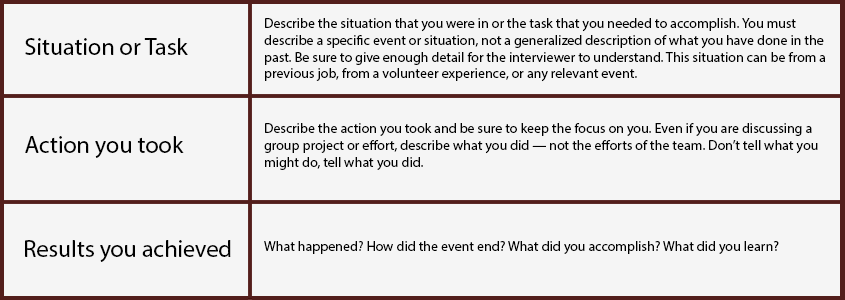Remember that many behavioral questions try to get at how you responded to negative situations; you’ll need to have examples of negative experiences ready, but try to choose negative experiences that you made the best of, or those that had positive outcomes.
USING THE STAR INTERVIEW APPROACH
The best way to attack the behavioral interview is using the three-step STAR process:
For example, you might recount a time when communication within your work group had broken down (situation). To resolve the problem, you organized informal lunch meetings for people to discuss relevant issues (action). Morale then improved, as did the lines of communication (result). Using this three step STAR process is a powerful way for you to frame your experiences and accomplishments for the interviewer.
HERE’S A GOOD WAY TO PREPARE FOR BEHAVIOR-BASED INTERVIEWS:
• Identify six to eight examples from your past experience where you demonstrated top behaviors and skills that employers typically seek. Think in terms of examples that will exploit your top selling points.
• Half your examples should be totally positive, such as accomplishments or meeting goals. The other half should be situations that started out negatively but either ended positively or you made the best of the outcome.
• Vary your examples; don’t take them all from just one area of your life.
• Try to describe examples in story form, such as the STAR approach.
• Be detailed and specific. You should have developed three stories that illustrate your past performance. Remember that the interviewer will be operating under the premise that “past performance in a similar setting is the best predictor of future performance.”
• Limit rambling and tangents. While you can’t control what is asked, you can control what you say.
• Listen carefully to each question. If you are unsure, rephrase the question and ask for clarification. When you respond, be sure to recall your past accomplishments in detail.
• Practice your behavioral stories using real-life examples. It is very difficult to make up behavioral stories, which is why behavioral interviewing is becoming more popular. By practicing, you will be able to recall with confidence your past accomplishments.
To cram for a behavioral interview right before you’re interviewed, review your resume. Seeing your achievements in print will jog your memory. With practice, you can learn to tailor a relatively small set of examples to respond to a number of different behavioral questions.
SAMPLE BEHAVIOR-BASED INTERVIEW QUESTIONS
• Describe a time when you got co-workers or classmates who dislike each other to work together. How did you accomplish this? What was the outcome? (teamwork)
• Tell me about a time when you failed to meet a deadline. What things did you fail to do? What were the repercussions? What did you learn? (time management)
• Describe a time when you put your needs aside to help a co-worker or classmate understand a task. How did you assist them? What was the result? (flexibility)
• Describe two specific goals you set for yourself and how successful you were in meeting them. What factors led to your success in meeting your goals? (goal setting)
• Give me a specific example of a time when a co-worker criticized your work in front of others. How did you respond? How has that event shaped the way you communicate with others? (communication)
• Describe a specific problem you solved for your employer. How did you approach the problem? What role did others play? What was the outcome? (decision making)


